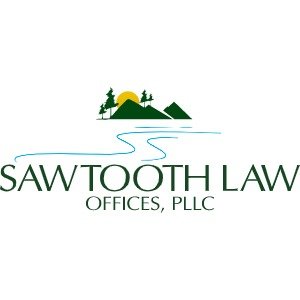Best Bankruptcy Lawyers in Boise
Share your needs with us, get contacted by law firms.
Free. Takes 2 min.
List of the best lawyers in Boise, United States
About Bankruptcy Law in Boise, United States
Bankruptcy law in Boise, United States, provides people and businesses with a legal process to discharge or restructure their debts under the protection of federal courts. The primary goal is to relieve debtors from overwhelming financial burdens while ensuring fair treatment to creditors. Boise, as part of Idaho, follows federal bankruptcy laws, although there are specific state-level exemptions and regulations that affect the process. The city’s legal landscape offers options such as Chapter 7, Chapter 11, and Chapter 13 bankruptcies, catering to different needs depending on the debtor's financial situation and goals.
Why You May Need a Lawyer
There are several situations in which individuals or businesses may require legal help with bankruptcy. The bankruptcy filing process can be complex, and a lawyer can ensure all documentation is completed accurately and on time, reducing the chance of dismissal or denial. A lawyer can also provide valuable advice on which type of bankruptcy to file, depending on the individual's financial situation and future goals. Additionally, legal representation might be necessary to protect significant assets, negotiate with creditors, and navigate any litigation that might arise during the proceedings.
Local Laws Overview
While Boise adheres to federal bankruptcy regulations, certain Idaho-specific laws and exemptions apply. Idaho allows debtors to use state-specific exemptions, which can be particularly relevant for assets like homestead properties, personal property, and pensions. These exemptions dictate what property can be retained through the bankruptcy process. Idaho has a notably generous homestead exemption compared to many states, which can protect some of a debtor's home equity from creditors. Furthermore, it is essential to understand Idaho's residency requirements and means test, which could influence one's eligibility for various types of bankruptcy filings.
Frequently Asked Questions
What is the difference between Chapter 7 and Chapter 13 bankruptcy?
Chapter 7 bankruptcy, often called "liquidation bankruptcy," involves selling a debtor's non-exempt assets to pay creditors, providing a fresh financial start. Chapter 13, known as "reorganization bankruptcy," allows debtors to keep their property and repay debts over three to five years based on an income-driven repayment plan.
Can I file for bankruptcy without a lawyer in Boise?
While it is possible to file for bankruptcy without an attorney, it’s generally not recommended. The process involves complex legal documentation, and mistakes could lead to unfavorable outcomes such as dismissal of the case.
What are Idaho's specific bankruptcy exemptions?
Idaho provides specific exemptions for homesteads, personal property, pensions, and more. The homestead exemption, for example, allows you to protect equity in your primary residence up to a specific value.
Will bankruptcy stop creditors from contacting me?
Yes, once you file for bankruptcy, an automatic stay goes into effect, which stops most creditors from continuing collection efforts, including calls and lawsuits.
How long will bankruptcy remain on my credit report?
Chapter 7 bankruptcy remains on your credit report for ten years from the filing date, while Chapter 13 stays for seven years.
What debts cannot be discharged in bankruptcy?
Certain debts like child support, alimony, some student loans, and specific tax obligations cannot typically be discharged in bankruptcy.
Can I keep my car if I file for bankruptcy in Boise?
It depends on the equity in the vehicle and the applicable state exemptions. In many cases, debtors can keep their primary vehicle through bankruptcy if the equity is protected by the exemption.
Is bankruptcy public record?
Yes, bankruptcy filings are public records. However, personal information is protected to some extent, and accessibility may vary.
How do I qualify for Chapter 7 bankruptcy in Boise?
Eligibility is determined primarily by passing the means test, which assesses your income and expenses relative to Idaho's median household income.
How often can I file for bankruptcy?
There are time limits on subsequent filings: eight years from a previous Chapter 7 discharge and two years from a Chapter 13 discharge to file again under the respective chapters.
Additional Resources
For further information and assistance with bankruptcy in Boise, the following resources may be helpful:
- Idaho Bankruptcy Court: Provides necessary forms, scheduled hearings, and procedural rules for bankruptcy cases.
- Idaho Legal Aid Services: Offers free or low-cost legal advice and representation to eligible low-income families.
- National Foundation for Credit Counseling (NFCC): Offers consumer credit counseling to help manage debt and explore alternatives to bankruptcy.
- Boise Public Library: Hosts legal workshops and provides access to legal reference materials and assistance.
Next Steps
If you find yourself considering bankruptcy as an option in Boise, it is essential to consult with a qualified bankruptcy attorney. Start by researching local attorneys who specialize in bankruptcy law, review their qualifications, and consider scheduling a consultation to discuss your specific financial situation. A reputable lawyer can guide you through the process, help you understand your rights and options, and work towards achieving the most favorable outcome for your case. Remember to gather all relevant financial documents to assist in your initial consultation for a comprehensive evaluation.
Lawzana helps you find the best lawyers and law firms in Boise through a curated and pre-screened list of qualified legal professionals. Our platform offers rankings and detailed profiles of attorneys and law firms, allowing you to compare based on practice areas, including Bankruptcy, experience, and client feedback.
Each profile includes a description of the firm's areas of practice, client reviews, team members and partners, year of establishment, spoken languages, office locations, contact information, social media presence, and any published articles or resources. Most firms on our platform speak English and are experienced in both local and international legal matters.
Get a quote from top-rated law firms in Boise, United States — quickly, securely, and without unnecessary hassle.
Disclaimer:
The information provided on this page is for general informational purposes only and does not constitute legal advice. While we strive to ensure the accuracy and relevance of the content, legal information may change over time, and interpretations of the law can vary. You should always consult with a qualified legal professional for advice specific to your situation.
We disclaim all liability for actions taken or not taken based on the content of this page. If you believe any information is incorrect or outdated, please contact us, and we will review and update it where appropriate.










